Ki Khanga: Changing the Game…Literally!
I grew up on science fiction and fantasy, loving both genres equally, however, when I discovered Dungeons and Dragons back in 1980, my greatest love became fantasy.
Forced into game-mastering due to the racism of the white students who refused to teach Black students to play, or who treated us like “orcs” when they did teach us, my storytelling grew from the simple stories about Shaft, Billie Jack, Luke Cage and the Falcon I would tell to entertain my friends and family, to the building of complex worlds inhabited by complex characters – Fantasy worlds filled with intrigue, adventure, horror and humor.
Wanting to tell better Fantasy stories and to create a richer world for the players in my Dungeons and Dragons campaigns, I became a voracious reader of fantasy novels, reveling in the richly-textured worlds of J.R.R. Tolkien, C.S. Lewis and Robert E. Howard.
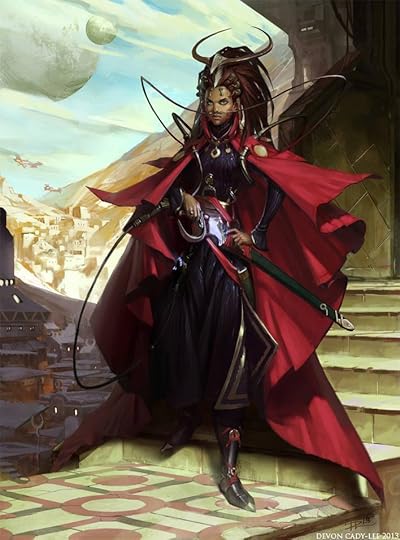
After two years of enthusiastic play, however, I – and my friends, it turned out – was tired of playing such a Eurocentric game. We had grown tired of lands that were obvious representations of England, Germany and Poland. These settings were not offering us anything new; anything we had not seen in slightly different forms over and over again. To make the game interesting, many of my friends would create a character that was a ninja or samurai – because they were people of color, which made them unique and because they were ninjas and samurai, which made them cool.
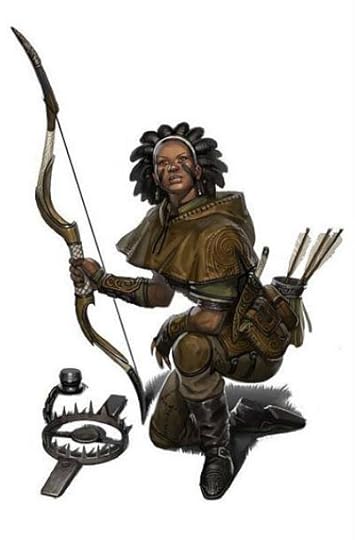
When I decided to introduce a Mandinka king who had come to the Land of Nod – we called all Eurocentric settings “The Land of Nod” because, for us, they had become boring and powerful sleep-inducers – to hunt the vampires who murdered his family, however, our interest in the game resurged. The players in my group begged to have their characters accompany the king back to Mali once they helped kill the vampire hordes infesting the Land of Nod. I agreed and everyone went into a frenzy; they, to find armor, clothing, weapons and spells appropriate to the terrain; I, to research ancient Mali and African folklore, creature lore and social, military and ecological systems and to create a world worthy of my players and of Africa.
From this experience, I learned that a writer has to do three things in order to create a fantasy world that is real enough for readers to escape to; to immerse themselves in; to feel:
Know it personally.
Research; research; research.
Make it up.
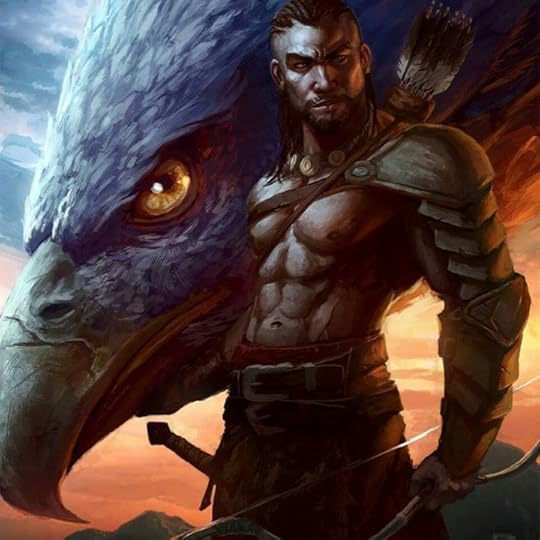
For my friends who do not write fiction, you probably think that writers of fantasy rely entirely on “making it up”, but you would be wrong. For the most part, fantasy worlds – just like worlds in hard-boiled crime, horror and romance – are based on something.
Very often, fantasy worlds are an altered or hybridized version of a pre-modern, non-technological human society, which means, to create a world that readers will accept as real, you gotta research, research, research!
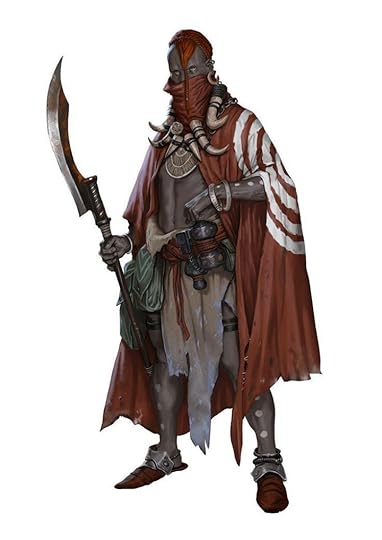
The best places to find new ideas for fantasy world-building are in reading about history, culture and “real-world” systems of belief. If an author’s only research is other fantasy novels, he or she will wind up borrowing Eurocentric milieus from the rest of the genre – and give us even more cliché from the Land of Nod.
We need more worlds like Charles Saunders’ Nyumbani – “home” in Swahili – a world based on the traditions, legends and lands of Africa. Saunders, the founder and father of the fantasy subgenre Sword and Soul, has created a world that is fantastic, yet very real. Nyumbani is home to Saunders’ Imaro, one of the greatest and most interesting heroes in the history of fantasy fiction.
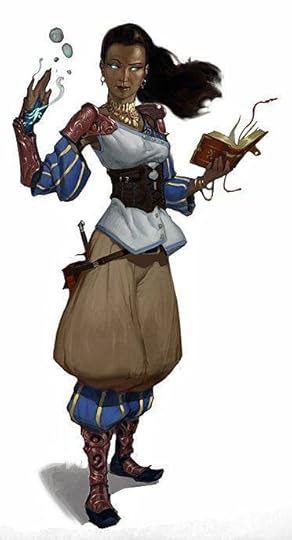
Taking inspiration from Charles Saunders, authors Milton J. Davis and Balogun Ojetade (full disclosure: that’s me), no strangers to world-building themselves, joined forces to create Ki-Khanga, a unique world that draws readers in and keeps them there. What, exactly is Ki-Khanga? How does this world “work”? Well, Charles Saunders says it best:
“Ki-Khanga is an Africa that could have been, located in a world that might have been. Sprung from the fertile minds of Milton J. Davis and Balogun Ojetade, Ki-Khanga is a place of magic and mystery, heroism and horror, spears and seduction. It is a place roiled by the long-reaching repercussions of an ancient feud between pre-human races and the subsequent wrath of an affronted deity. Not only does magic work in Ki-Khanga – magic defines Ki-Khanga, in more ways than one.”
I invite you to join us on the sandy shores, perilous mountains and mysterious savannahs of our world. I invite you to ride beneath the dunes of Targa in the bowels of the oga’koi-koi or to do battle with the Ndoko in the Great Circle. I invite you to share in our tales of triumph; of tragedy; of terror and tenacity. I invite you to free yourself from the Land of Nod…and flee to Ki-Khanga!
Help us change the game by supporting the Kickstarter for Ki-Khanga: The Sword and Soul Role-Playing Game.
Sword and Soul forever!
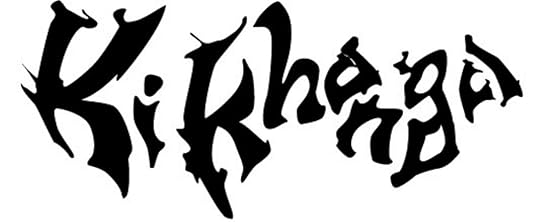


Forced into game-mastering due to the racism of the white students who refused to teach Black students to play, or who treated us like “orcs” when they did teach us, my storytelling grew from the simple stories about Shaft, Billie Jack, Luke Cage and the Falcon I would tell to entertain my friends and family, to the building of complex worlds inhabited by complex characters – Fantasy worlds filled with intrigue, adventure, horror and humor.
Wanting to tell better Fantasy stories and to create a richer world for the players in my Dungeons and Dragons campaigns, I became a voracious reader of fantasy novels, reveling in the richly-textured worlds of J.R.R. Tolkien, C.S. Lewis and Robert E. Howard.

After two years of enthusiastic play, however, I – and my friends, it turned out – was tired of playing such a Eurocentric game. We had grown tired of lands that were obvious representations of England, Germany and Poland. These settings were not offering us anything new; anything we had not seen in slightly different forms over and over again. To make the game interesting, many of my friends would create a character that was a ninja or samurai – because they were people of color, which made them unique and because they were ninjas and samurai, which made them cool.

When I decided to introduce a Mandinka king who had come to the Land of Nod – we called all Eurocentric settings “The Land of Nod” because, for us, they had become boring and powerful sleep-inducers – to hunt the vampires who murdered his family, however, our interest in the game resurged. The players in my group begged to have their characters accompany the king back to Mali once they helped kill the vampire hordes infesting the Land of Nod. I agreed and everyone went into a frenzy; they, to find armor, clothing, weapons and spells appropriate to the terrain; I, to research ancient Mali and African folklore, creature lore and social, military and ecological systems and to create a world worthy of my players and of Africa.
From this experience, I learned that a writer has to do three things in order to create a fantasy world that is real enough for readers to escape to; to immerse themselves in; to feel:
Know it personally.
Research; research; research.
Make it up.

For my friends who do not write fiction, you probably think that writers of fantasy rely entirely on “making it up”, but you would be wrong. For the most part, fantasy worlds – just like worlds in hard-boiled crime, horror and romance – are based on something.
Very often, fantasy worlds are an altered or hybridized version of a pre-modern, non-technological human society, which means, to create a world that readers will accept as real, you gotta research, research, research!

The best places to find new ideas for fantasy world-building are in reading about history, culture and “real-world” systems of belief. If an author’s only research is other fantasy novels, he or she will wind up borrowing Eurocentric milieus from the rest of the genre – and give us even more cliché from the Land of Nod.
We need more worlds like Charles Saunders’ Nyumbani – “home” in Swahili – a world based on the traditions, legends and lands of Africa. Saunders, the founder and father of the fantasy subgenre Sword and Soul, has created a world that is fantastic, yet very real. Nyumbani is home to Saunders’ Imaro, one of the greatest and most interesting heroes in the history of fantasy fiction.

Taking inspiration from Charles Saunders, authors Milton J. Davis and Balogun Ojetade (full disclosure: that’s me), no strangers to world-building themselves, joined forces to create Ki-Khanga, a unique world that draws readers in and keeps them there. What, exactly is Ki-Khanga? How does this world “work”? Well, Charles Saunders says it best:
“Ki-Khanga is an Africa that could have been, located in a world that might have been. Sprung from the fertile minds of Milton J. Davis and Balogun Ojetade, Ki-Khanga is a place of magic and mystery, heroism and horror, spears and seduction. It is a place roiled by the long-reaching repercussions of an ancient feud between pre-human races and the subsequent wrath of an affronted deity. Not only does magic work in Ki-Khanga – magic defines Ki-Khanga, in more ways than one.”
I invite you to join us on the sandy shores, perilous mountains and mysterious savannahs of our world. I invite you to ride beneath the dunes of Targa in the bowels of the oga’koi-koi or to do battle with the Ndoko in the Great Circle. I invite you to share in our tales of triumph; of tragedy; of terror and tenacity. I invite you to free yourself from the Land of Nod…and flee to Ki-Khanga!
Help us change the game by supporting the Kickstarter for Ki-Khanga: The Sword and Soul Role-Playing Game.
Sword and Soul forever!



Published on October 06, 2016 08:16
No comments have been added yet.



